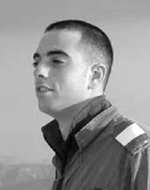Ben Rosa and Abraham, brother of Hila, Naama and Yuval. Was born on Sukkot on the 17th of Tishrei 5744 (13.10.1984) in Givat Nesher. Although Sukkot was born, his name was chosen as inspired by the Festival of Lights, which symbolizes courage, courage, daring, personal devotion and light. Uri, son, brother and grandson of the families of Binamo and Tugentman, grew up in the city of Nesher and was educated on the love of man and love of the land. He studied at Nesher at the Beit Yehoshua elementary school and at the “Makif Nesher” high school. He stood out as a true friend and natural leader, and throughout his life dreamed, initiated, operated, implemented and believed in his path with complete faith. Uri loved life! He loved his girlfriend, his friends, parties, trips, cars, motorcycles, horses, and his life was full of challenges and excitement. With his enthusiasm and determination, everyone around him – his family, his friends, his soldiers and even strangers – continued to take part in fulfilling the challenges he set for himself, thereby discovering their personal abilities. At the age of fourteen, Uri wrote the song “I wish”: “Next year I hope there will be no wars I hope there will be peace And still it is a dream And I also have a vision that there will be no hole in the ozone I wish the world only good and the prime minister will start thinking I wish the world Only good things Love, brotherhood and peace among the nations I hope you will succeed in school and do not give us many pages I wish the world other things, too, I wish everyone would be friends. ” Uri loved his family and saw it as a cornerstone of his development. “Uri’s House” was always a source of warmth and love for everyone who came. As a grandson of Holocaust survivors, Uri saw in the Holocaust and love of the State of Israel a central motive for his dedication to his military service. Uri was asked to join one of the combat units in the army and at the end of November 2002 he was assigned as a combat soldier in the Nachshon Battalion, and was sent to a paramedic course at the end of his service, After graduating briefly, his commanders decided to send him to a course for squad commanders, and at the end of the course he became the squad commander of the company in which he grew up, and despite his command of his class, Uri managed to develop a unique relationship with his soldiers. After three months, he was sent to the officers’ course He was appointed commander of a platoon in the operational company, and at the end of November 2005 he began his career in the regular army, where Uri built a mission for the department that was based on camouflage. ), Intelligence information was received in the Nachshon Battalion about a suicide bomber on his way to carry out an attack in Israel, along with three of his soldiers, set up a checkpoint at the southern exit of Tulkarm city to prevent the terrorist from crossing. Uri took his soldiers away and demanded from the passengers of the taxi to go out and expose their coats. Two terrorists were killed while Uri was killed on the spot. In his actions, Uri found courage, courage and devotion to the mission, thereby preventing a major disaster, saving many lives and bringing the people of Israel a “miracle of Chanukah.” Uri was twenty-one years old when he fell. He was laid to rest in the military cemetery in Haifa. He was followed by parents and three sisters. After his fall he was promoted to lieutenant. Uri invested all his strength in nurturing his soldiers and took care of all their needs even during his vacations. After his death, the commanders and soldiers in his department told him of his professionalism, his humility, the intelligence and sensitivity he displayed in commanding them, and the fact that they saw him as a father figure for the entire department. Uri was a man, a friend, a fighter and an officer who was a symbol and model for his family, friends and soldiers. On the 50th Independence Day”On the morning of December 29, 2005, two suicide bombers exploded at the intersection,” said Brigadier General Yair Golan, commander of the Judea and Samaria Division. South of Tulkarm, when they were stopped for inspection by a patrol of the Nachshon Battalion, and Uri Binyamu, who commanded the patrol, placed the patrol team and instructed him to perform a thorough check of vehicles coming from Tulkarm. Which he thought was suspicious, aroused one of the passengers’ suspicions, and the officer demanded that the Palestinian remove his coat, Moved to a shelter, and during this operation the active Palestinian luggage carrying a weapon. The blast killed the deputy Uri Binamo determination of Lieutenant Uri Binamo prevented a suicide attack and saved the citizens of Israel catastrophe. That is awarded to the deputy Uri Binamo praised by the division commander. ” In memory of Uri, an internet site was established at: http: //uri-binamo.ad-olam.co.il
